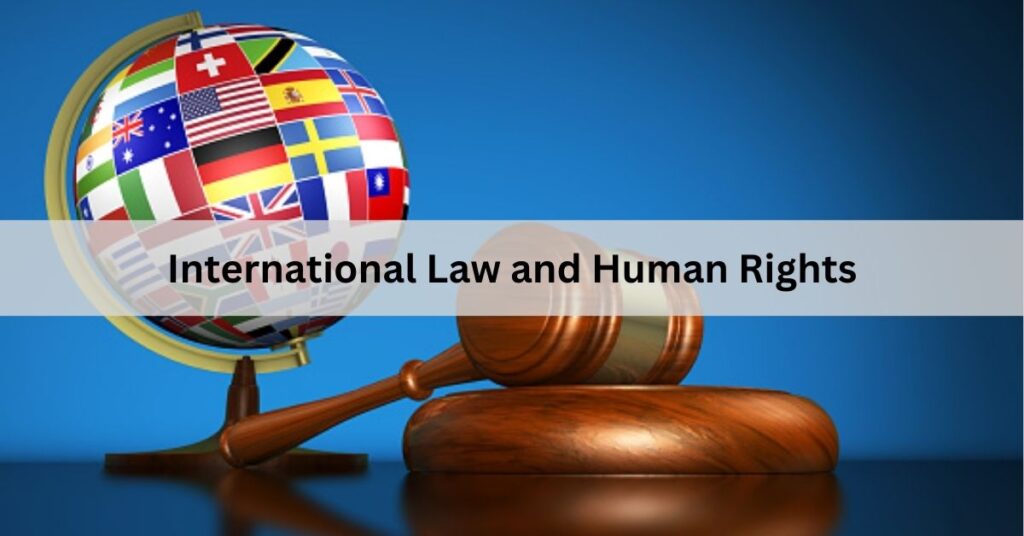International law is a body of rules and principles that govern the relations and interactions between states and other international actors. It encompasses a wide range of issues, from trade and diplomacy to war and peace. Central to international law is the protection of human rights, which are the fundamental rights and freedoms to which all individuals are entitled.
Contents
- 1 The Evolution of Human Rights in International Law
- 2 Key International Human Rights Instruments
- 3 The Role of International Organizations
- 4 Regional Human Rights Systems
- 5 Enforcement and Compliance
- 6 Challenges to Human Rights Protection
- 7 The Impact of Human Rights Violations
- 8 The Future of International Human Rights Law
- 9 Conclusion
The Evolution of Human Rights in International Law
Human rights have become a cornerstone of international law, especially after World War II. The horrors of the war highlighted the need for a universal framework to protect individuals from abuses. This led to the creation of the United Nations (UN) and the adoption of the Universal Declaration of Human Rights (UDHR) in 1948. The UDHR laid the groundwork for a series of international treaties and conventions that aim to protect human rights globally.
Key International Human Rights Instruments
Several key instruments form the backbone of international human rights law. These include:
- Universal Declaration of Human Rights (UDHR): Adopted by the UN General Assembly, it sets out fundamental human rights to be universally protected.
- International Covenant on Civil and Political Rights (ICCPR): This treaty ensures the protection of civil and political rights such as freedom of speech, assembly, and religion.
- International Covenant on Economic, Social and Cultural Rights (ICESCR): This treaty guarantees rights related to work, education, health, and an adequate standard of living.
- Convention on the Elimination of All Forms of Discrimination Against Women (CEDAW): Focuses on eliminating discrimination against women.
- Convention on the Rights of the Child (CRC): Ensures the protection of children’s rights worldwide.
These instruments collectively form the International Bill of Human Rights and are legally binding on the states that ratify them.
The Role of International Organizations
International organizations play a crucial role in promoting and protecting human rights. The United Nations, through its various bodies and agencies, monitors compliance with human rights treaties, investigates violations, and provides assistance to countries in implementing human rights standards.
The Office of the High Commissioner for Human Rights (OHCHR) is a key UN agency responsible for promoting and protecting human rights globally. It works closely with other UN bodies, regional organizations, and non-governmental organizations (NGOs) to address human rights issues.
Regional Human Rights Systems
In addition to the global framework, regional human rights systems have been established to address specific issues within different parts of the world. These systems include:
- The European Convention on Human Rights (ECHR): Overseen by the European Court of Human Rights, it provides a mechanism for individuals to bring cases against states for human rights violations.
- The Inter-American System for the Protection of Human Rights: Includes the American Convention on Human Rights and the Inter-American Court of Human Rights.
- The African Charter on Human and Peoples’ Rights: Overseen by the African Commission on Human and Peoples’ Rights and the African Court on Human and Peoples’ Rights.
These regional systems complement the global framework by addressing unique regional challenges and providing additional avenues for the protection of human rights.
Enforcement and Compliance
One of the significant challenges in international human rights law is ensuring compliance and enforcement. While international treaties create obligations for states, there is no global police force to enforce these rights. Compliance relies on various mechanisms, including:
- Peer Review: States are reviewed by their peers in international forums, such as the Universal Periodic Review (UPR) conducted by the UN Human Rights Council.
- Reporting and Monitoring: States are required to submit regular reports on their compliance with human rights treaties, which are reviewed by treaty bodies.
- International and Regional Courts: Courts like the International Criminal Court (ICC) and regional human rights courts provide legal recourse for individuals and groups whose rights have been violated.
Despite these mechanisms, enforcement remains a complex issue, often influenced by political, economic, and social factors.
Challenges to Human Rights Protection
Several challenges hinder the effective protection of human rights globally:
- Political Will: Governments may lack the political will to implement human rights obligations, especially when it conflicts with national interests or security concerns.
- Cultural Relativism: Different cultural and religious beliefs can sometimes clash with international human rights standards, leading to resistance against certain rights.
- Economic Constraints: Limited resources can impede a state’s ability to fulfill its human rights obligations, particularly in developing countries.
- Conflict and Instability: Armed conflicts and political instability can lead to widespread human rights violations and hinder efforts to protect and promote human rights.
Addressing these challenges requires a concerted effort from the international community, including states, international organizations, and civil society.
The Impact of Human Rights Violations
Human rights violations have far-reaching consequences for individuals, communities, and nations. These impacts include:
- Physical and Psychological Harm: Violations such as torture, arbitrary detention, and discrimination cause immense suffering and trauma.
- Social and Economic Consequences: Discrimination and lack of access to education, healthcare, and employment opportunities can perpetuate poverty and inequality.
- Political Instability: Widespread human rights abuses can lead to social unrest, conflict, and the breakdown of governance structures.
- International Relations: Human rights violations can strain diplomatic relations and lead to sanctions or other measures by the international community.
Efforts to prevent and address human rights violations are essential for promoting peace, stability, and sustainable development.
The Future of International Human Rights Law
The future of international human rights law faces both opportunities and challenges. Technological advancements, such as artificial intelligence and digital surveillance, pose new threats to privacy and freedom. At the same time, technology can also be harnessed to protect and promote human rights, such as through the use of social media to raise awareness and mobilize action.
Climate change and environmental degradation present additional challenges, as they disproportionately affect vulnerable populations and can lead to new human rights violations. Addressing these issues requires integrating human rights considerations into environmental policies and ensuring that the transition to sustainable development is inclusive and equitable.
The rise of populism and nationalism in some parts of the world has also led to a backlash against international human rights standards. Countering this trend requires reinforcing the universality of human rights and strengthening the international human rights system.
Conclusion
International law and human rights are fundamental components of the global legal framework, aimed at protecting the dignity and rights of individuals worldwide. Despite significant progress, numerous challenges remain in ensuring compliance and addressing violations. As the world continues to evolve, it is crucial to adapt and strengthen human rights mechanisms to address emerging threats and promote a just and equitable global society. The ongoing commitment of the international community, including states, international organizations, and civil society, is essential for the continued advancement of human rights for all.



